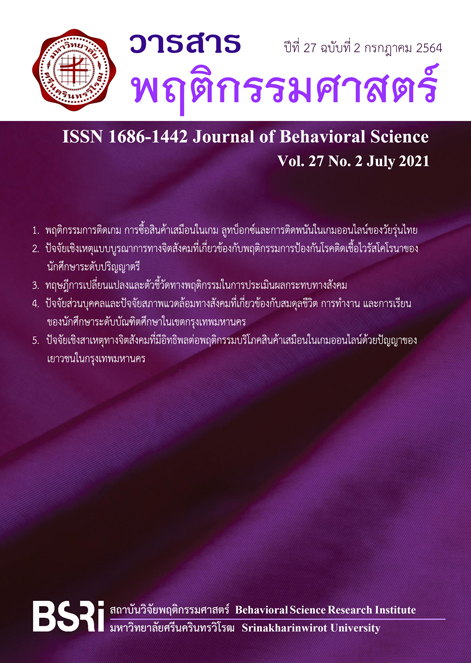Gaming Addiction Behavior, Virtual Goods Purchases in Game, Loot Boxes and Gambling in Online Game of Thai Adolescent
Keywords:
gaming addiction behavior, virtual goods purchases in game, loot boxes, thai adolescentAbstract
This research aims to examine gaming addiction behavior, virtual goods purchases in game, loot boxes, together with adolescent gambling addiction in online games and to figure out management, support, prevention, and solution for necessity of gaming security and standards. This study is a mixed methods research. Quantitatively, the research surveys 400 online game players who study in secondary and tertiary levels. Qualitatively, documentary analysis and in-depth interview of 15 participants are selected methods. The results show that 1) behavior and risk of gaming addiction for Thai adolescents are not different in terms of gender. The participants are categorized into 3 groups: normal game-players, game maniacs, and possible game addicts. 2) For virtual goods purchases in game or gambling addictions online, majority of the participants are new gamblers (72.25%), following by problem gamblers (17.50%), and pathological gamblers (10.25%). 3) Suggestions for policy implications are integrated management of public, private and civil society sectors. The suggested examples are enhancing media literacy, ethics and social responsibility, drafting legislation on gaming and commercial gaming management, and raising awareness through creative communication.
Downloads
References
Babington, L. M., Christensen, M. H., & Pats daughter. (2000). C.A. Caught in the web of internet addiction, Nursing Spectrum, 4, 10-12.
Center for Gambling Studies. (2018). Rāingān sūn sưksā panhā kān phanan pī sō̜ngphan hārō̜ihoksipʻet [Center for Gambling Studies Report 2018]. http://www.gamblingstudy-th.org/imgadmins/book_file/[ebook]CGS-report-2018.pdf
Cronbach, L. J. (1984). Essentials of Psychological Testing (4th ed.). Harper & Row.
Chupaka, S. (2015). Māyā khati nai kānsư̄sān ʻō̜nlai nai wepsai kān phanan. [The Myth of Online Communication in Gambling Websites] (Research Report). Ramkhamhaeng University.
Department of Mental Health, Ministry of Public Health. (2018, November). Nưng - čhet Phrưtsačhikāyon sapdā sukkhaphāp čhit hǣng chāt [National Mental Health Week on 1st – 7th November, 2018]. https://www.dmh.go.th/news/view.asp?id=1239
Fairfield, J. (2005). Virtual property. Boston University Law Review, 85, 1047-1102. https://www.researchgate.net/publication/228167293_Virtual_Property
Gabriel, A. B., & Luke, C. (2019). Associations between loot box use, problematic gaming and gambling, and gambling-related cognitions. Addictive Behaviors, 96, 26-34. https://doi.org/10.1016/j.addbeh.2019.04.009
Griffiths, M. D., & Herbert, M. (2002). Gambling and Gaming Addictions in Adolescence. BPS Blackwell.
Hamari, J., & Lehdonvirta, V. (2010). Game design as marketing: How game mechanics create demand for virtual goods. International Journal of Business Science & Applied Management, 5(1), 14-29, https://ssrn.com/abstract=1443907
Janpratheep, T., & Pornying, J. (2020). Legal Measures to Regulate Online Gambling. Thaksin Procedia. http://libapp.tsu.ac.th/OJS/index.php/thaksinprocedia/article/view/
/47475002
Karaked, J. (2010). Khrư̄akhāi kēm ʻō̜nlai læ patčhai thī thamhai kœ̄t kān sīang chōk nai yaowachon kō̜ranī sưksā: Sāmkokʻō̜nlai (sām Kingdoms Online) læ sapēchīan fō̜t (Special Force). [Game online network and factor which cause youth would like to Gamble on game online. Studied case: 3 Kingdoms online and special force game] [Unpublished master's thesis]. Dhurakij Pundit University.
Ketsing, W. (2000). Sathiti wikhro̜ samrap kānwičhai [Analytical Statistics for Research]. Charoenpon Press.
Kotler, P., & Keller, K. (2006). Marketing Management (12th ed.). Prentice Hall.
Plianphadung, P. (2017). Māttrakān thāng kotmāi nai kān khūapkhum kān phanan ʻō̜nlai [Legal Measures to Regulate Online Gambling]. Center for Gambling Studies. http://www.gamblingstudy-th.org/issues_topic_1/300/1/1/%E0%B8%81%E0%B8%8E%E0
%B8%AB%E0%B8%A1%E0%B8%B2%E0%B8%A2%E0%B8%9E%E0%B8%99%E0%B8%B1%E0%B8%99%E0%B8%AD%E0%B8%AD%E0%B8%99%E0%B9%84%E0%B8%A5%E0%B8%99%E0%B9%8C/
Rogers, D. (1978). The Psychology of Adolescence. Appleton Century-Crofts.
Rovinelli, R. J., & Hambleton, R. K. (1977). On the use of content specialists in the assessment of criterion-referenced test item validity. Dutch Journal of Educational Research, 2, 49-60.
Ruangdetkhajorn, P. (2017). Loot box klō̜ng rāngwan rư̄ kān phanan ʻaithēm? [Loot Box, prize box or gambling item]. http://www.gamblingstudy-th.org/issues_topic_1/298/2/1/lootbox/
Visanuyothin, T., Wanpen, W., Wichai, S., Arunruang, P., Yotinchatchawan, J., Tiamsaeng, T., Yisunsri, N., Pai-Nguluerm, T., & Lateh, N. (2013). kānsamrūat sathānakān panhā phrưttikam sīang læ kān tit kēm nai nakrīan rōngrīan namrō̜ng rabop kāndūlǣ chūailư̄a nakrīan [The Survey of Risk Behavior Problems and Game Addiction among Students in Pilot Schools of Student Support System]. Child and Adolescent Mental Health Rajanagarindra Institute, Department of Mental Health. Ministry of Public Health.
West, R., & Brown, J. (2013). Theory of Addiction. Blackwell Publishing.
Zendle, D., & Cairns, P. (2019). Correction: Video game loot boxes are linked to problem gambling: Results of a large-scale survey. PLOS ONE, 14(3), e0214167. https://doi.org/10.1371/journal.pone.0214167
Downloads
Published
How to Cite
Issue
Section
License
Behavioral Science Research Institute, SWU
114 Sukhumvit 23, Bangkok 10110, Thailand.
Tel.02-649-5000 # 17600



